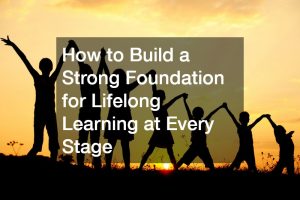- Learning benefits personal and professional growth, providing job satisfaction, increased career mobility, and higher wages.
- Music lessons help develop cognitive skills such as problem-solving, memory, focus, and creativity.
- Career certification programs provide valuable tools and are often required by employers.
- Travel provides a unique opportunity to explore cultures, learn language skills, or join volunteer projects.
- Taking an active approach to learning can help an individual gain valuable life experience.
Learning is one of the most important aspects of personal and professional growth. It not only helps people understand the world, but it also allows them to develop new skills and knowledge that can be used in their daily lives. With the right learning strategy, it is possible to achieve personal and professional success.
Studies have shown that those actively engaging in learning activities are more likely to experience higher job satisfaction, greater career mobility, and even increased wages than their peers who do not prioritize learning. In addition, research has proven that individuals who continually learn new skills or acquire new knowledge have better problem-solving abilities and higher cognitive functioning than those who do not.
Of course, honing the learning skills will take time and effort. However, there are plenty of ways to start a new learning journey. Here are a few areas to consider:
Music Lessons

Learning music has been proven to enhance a person’s ability to learn and think critically. Studies suggest music can help students develop cognitive skills such as problem-solving, memory, focus, creativity, and more. To make sure that you are getting the most out of your learning experience with music lessons, here are four of the best classes to consider:
Piano Lessons
Piano lessons provide an excellent foundation for beginner musicians by introducing them to different chords and notes to produce sound. Through piano lessons, individuals will understand the theory and be able to read sheet music and play it by ear. Piano lessons also teach basic rhythm and technique, which can be applied to other instruments.
Guitar Lessons
Guitar lessons introduce learners to strumming patterns, playing chords on the guitar neck, picking techniques, improvisation skills, and more. By engaging in guitar lessons, students can learn how to play various popular songs and create compositions depending on their skill level.
Voice Lessons
Voice lessons are perfect for those who wish to improve their vocal range or expand their repertoire of songs they know how to sing. Singing is more than just producing sound; it is about expressing emotion through song selection and vocal delivery. With voice lessons, students will learn proper breathing techniques, pitch control, vibrato techniques, articulation exercises for clarity of sound production, dynamics (volume control), phrasing strategies (how long/short each note should be), etc.
Violin Lessons
Violin lessons are ideal for beginners looking to master the basics of playing the instrument to perform at an intermediate level. Violin lessons cover various topics such as posture, fingering techniques, bowing exercises, variations in dynamics and slides, intonation (adjusting pitch accuracy), vibrato technique, etc. You can find beginner violin classes for any age group, whether it’s a child or an adult.
Career Certification Programs
If you want to improve on learning, you might want to pick up a few valuable tools. As a result, many employers now require resumes demonstrating a potential candidate has taken the initiative to get career certification.
These certifications can take a few months to a year or two, depending on the program and level of expertise sought. Some examples of these programs include Microsoft Office Certification, Adobe Creative Cloud Training Program, QuickBooks Online Certification, and more.
Of course, online courses are also ideal since they are usually structured to make them easier to navigate, learn quickly, and save money. Regardless of the training program you choose, ensuring that the content is up-to-date and relevant for use in the job market is vital.
Travel

Travel has long been a vessel for learning, allowing us to experience different cultures, explore new places, and gain knowledge of the world. Not only does travel make for an incredible learning opportunity, but it can also be a great way to discover hidden talents and gain valuable life experiences.
Through travel, people can observe different customs and traditions compared to their culture. This helps them learn more about the history of a place and gain an understanding of various cultures all around the world. Additionally, traveling allows people to step outside their comfort zone and try something new with the help of locals who may know more about the area than they do. They can explore ancient ruins and monuments, visit cultural sites such as museums or galleries, or just take in the beauty of nature through hikes or other outdoor activities.
The learning opportunities that come with travel don’t stop there. During your travels, you can pick up language skills by speaking with locals or taking cooking classes with professional chefs to try out local dishes from different countries. Moreover, you could even join volunteer projects that allow you to positively impact society while gaining a better understanding of global issues in the process.
Final Thoughts
Learning is a lifelong journey, so taking an active approach is vital to get the most out of your experience. Consider trying different classes and activities that spark your interest and picking up certifications that may benefit you in the job market. Also, don’t be afraid to try new things while traveling! You never know what skills and knowledge you could gain from exploring cultures worldwide. With these lessons in mind, you can begin your learning journey today!


